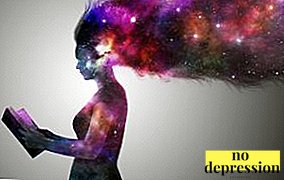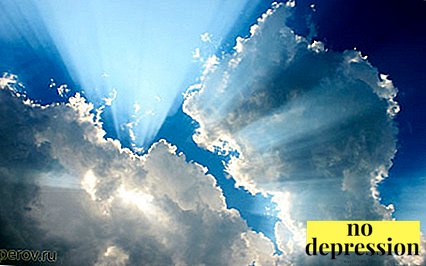A qualitative feature of the human psyche is the presence of consciousness, self-awareness.
They perform a variety of functions that determine man's attitude to himself and to the surrounding reality.
Basic concepts

Consciousness - This is the highest function of the human brain.
It allows you to reflect the surrounding reality, to interpret all occurring phenomena and events, to plan the upcoming actions and to anticipate their results.
Consciousness helps to control their behavior, regulate activities.
Its main components are: attention, memory, will, emotions and feelings.
Attention - ability to perceive the environment and concentrate on individual objects. Attention helps a person in cognitive activity.
Memory - It is the ability to capture learned images and reproduce them if necessary in the future.
The will directs all actions and actions of the individual. It is a motivating force that forces one to act purposefully.
Emotions and feelings are the highest stages of the development of consciousness, thanks to which it becomes possible to build interpersonal relationships, the manifestation of the experienced internal sensations.

A special phenomenon from the point of view of psychology is mind off ability.
Once the necessary skills and skills are learned, they can be carried out automatically.
In this case control over your behavior is no longer needed, as the body itself makes the usual actions, worked during the acquisition of skill.
Thus, an experienced pianist does not think about the movements of his hands during a game, and an experienced driver does not analyze the manipulations he makes during driving.
Self-consciousness is the highest level of consciousness, which reflects the human perception of himself as a person. It forms ideas about your body, about your character, about relationships with people, about a place in society, about achievements, etc.
There are three main levels of self-awareness.:
- The first. Representations of the body and its place in the surrounding space. At this level, there is an understanding that our body is a separate independent phenomenon, which to a certain extent is included in the existing order of things.
- Second. Attitude to a particular social group, community, social institution. At this level, the individual perceives himself through the prism of his social life.
- Third. The most difficult and important level that allows you to identify your own "I". A person perceives himself as a full-fledged person with a set of qualities, emotions, feelings, abilities. He fully understands his spiritual, emotional, and intellectual needs and abilities. He is responsible for his own actions, desires and for his future.

Properties
We can distinguish the following basic propertiesinherent in the consciousness of the individual from a psychological point of view:
- Activity. Only in the conditions of active brain activity, it becomes possible to achieve the goals set, to obtain the desired results. The brain is constantly in a state of readiness. Any situation is analyzed, every opportunity is considered and used to achieve goals.
Everyone understands what he wants, what he wants. He also objectively understands that in order to get what he wants, he needs to take appropriate steps.
In an effort to obtain the necessary thing, to achieve the desired result, usually a person is capable of much and does not stop in front of difficulties.
- Dynamic. Attention always changes and switches. When it becomes necessary to concentrate on an object or to perceive important information, the individual fully mobilizes his resources and directs him to a specific object. If the situation changes and there is a need to manifest attention to another object, the consciousness is immediately rebuilt. Such dynamism allows us to immerse in the essence of the phenomena and processes that are relevant at the current time.
- Reflection. Reflection is understood as the tendency to constant self-analysis, to thinking about your own life. Every individual periodically thinks about his own successes and failures, about achievements and failures. He analyzes himself in the past and in the present, makes claims to himself and outlines a plan for further development. Reflection allows you to effectively observe yourself and your experiences throughout your life, draw important conclusions and strive to change the situation for the better.
Constant work on yourself is an effective tool for development.
- Value orientation. Moral attitudes and principles that are peculiar to people, mainly determine their behavior. A person rarely acts inconsistently with his inner attitudes, since this leads to serious intrapersonal conflicts and psychological problems in the future. As a rule, any mental activity is formed precisely on the basis of an analysis of existing value systems.

Functions

The level of development of the components of consciousness affects the severity of its functions.
All people have different abilities, because the features of memory, will and attention are different.
The main functions of consciousness:
- Cognitive. In the course of his whole life, a person knows the reality surrounding him. This is reflected in the acquisition of knowledge about nature, about the world, about society, about itself. The cognitive function begins to manifest itself from the first days of the birth of a child into the world as his intellect develops and he receives basic ideas about the world. Throughout life, this process continues. Getting an education, learning moral and value norms in the family, self-development - all this leads to a constant knowledge of reality.
The more an individual is prone to cognitive activity, the higher his level of development.
- Constructive. A person is able to independently represent any objects, using existing knowledge and his own imagination. He can predict the development of events, create previously non-existent objects. It is thanks to this function that scientific progress became possible. People did not dwell on the perception of those images and phenomena that already existed at the moment. They always strived for new achievements and created their own objects, which were not there before.
 Imagination is a powerful stimulus of activity. Once people believed that it was impossible to rise into the sky or into space. But the constructive ability of the consciousness of those who study these issues has allowed to change the existing ideas and achieve their goals.
Imagination is a powerful stimulus of activity. Once people believed that it was impossible to rise into the sky or into space. But the constructive ability of the consciousness of those who study these issues has allowed to change the existing ideas and achieve their goals. - Regulatory. This ability to self-control, to self-discipline. If we did not know how to control our emotions, our desires and behavior, then life in society would be a complete chaos. Man is able to control his behavior and even his thoughts. This allows him in the interaction in society to act in accordance with existing rules and regulations.
Persons with impaired regulatory functions, as a rule, differ in deviant behavior.
- Prognostic. People tend to foresee their future as much as possible. They always make plans based on their own ideas, desires, life experience. It is impossible to predict your whole life, since unplanned, unpredictable events often occur in it. But individual moments to a certain limit can be foreseen.
Self-awareness performs the following functions:
- Regulatory. A person controls and organizes his behavior, guided by internal attitudes and ideas about himself. Regulatory function allows you to build not only relationships with yourself, but also with others.
- Self improvement. Each of us has a certain potential that can be fully realized or only in some part. The degree of desire for self-improvement and development is directly determined by the dedication of the individual, his interest in the development process itself. Individuals striving for self-realization, for expanding their living space, always try to improve themselves.
- Existential. Any person, regardless of his level of development, periodically thinks about the meaning of life. These can be thoughts about the existence of the world as a whole or thoughts about one’s own purpose.
The existential function motivates to achieve new goals that justify the existence and give impetus to later life.
- Integrative. The ability to effectively combine their own individual installations with public norms. Personal values are formed largely under the influence of universal values (learned from traditions, culture, history), which allows to establish the harmony between socialization and individualization. A person feels his involvement in the society in which he lives, but at the same time he does not give up his own traits.
- Protective. Aware of his own "I", the individual always seeks to protect him from external interference. He does not allow the opinions and attitudes of other members of society to shake his ideas about himself, to change his perception of his own personality.


States: sleep and wakefulness
One of the most common states of consciousnessexperienced on an ongoing basis, are sleep and wakefulness.
Sleep - This is a period of rest, during which the mental activity stops completely or partially. Good sleep is an important condition for a healthy physiological and psychological state.
Nedosypy, insomnia, poor quality of sleep immediately affect the work of consciousness. All of its key components (attention, memory, etc.) are malfunctioning.
Wake - a period of activity during which the person is fully functioning. In the vast majority of adults, the state of wakefulness is observed much more often than the state of sleep. On average, 2/3 days in an adult person is given for wakefulness.

The constant desire for activity to the detriment of sleep leads to a lot of problems: irritability, low stress tolerance, memory impairment, concentration problems, etc.
According to functionalism, psychology is the science of the functions of consciousness. Consciousness and self-awareness are integral elements of personality.
The higher the level of their development, the more a person has the ability to objectively perceive themselves and others.
Structure and functions of consciousness:

 Imagination is a powerful stimulus of activity. Once people believed that it was impossible to rise into the sky or into space. But the constructive ability of the consciousness of those who study these issues has allowed to change the existing ideas and achieve their goals.
Imagination is a powerful stimulus of activity. Once people believed that it was impossible to rise into the sky or into space. But the constructive ability of the consciousness of those who study these issues has allowed to change the existing ideas and achieve their goals.

